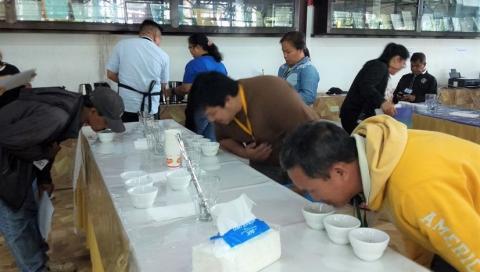Training of Trainor (TOT) participants consisting of coffee farmers, processors and technicians from the different municipalities get to experience cupping and sensory analysis during the training proper.
Lantapan, Bukidnon---Considered as one of the most viable crops grown by our local farmers, coffee continues to contribute in the growth of our agriculture sector as well as the obvious choice among early risers in the country today.
Recently, the Agricultural Training Institute-Regional Training Center X (ATI-RTC X) through its Career Development and Management Services (CDMS) conducted a Training of Trainers (TOT) on Harvesting, Post-Harvest Handling and Processing and Sensory Appreciation in Coffee at the Binahon Agroforestry Farm (BAFF) in Songco, Lantapan, Bukidnon.
The three-day training was participated in by 29 coffee farmers, processors and technicians from the different municipalities identified by ACDI-VOCA. The said training was in partnership with ACDI-VOCA, a US-based non-profit organization that implements the USDA-funded Philippine Coffee Advancement and Farm Business Enterprise (PhilCAFE) Project. PhilCAFE is a five-year project aimed at promoting specialty coffee and increasing production of coffee.
The training also emphasized the importance of good agricultural practices on coffee harvesting, post -harvest handling and processing. Appreciation on cupping and sensory analysis of coffee was also included where participants experienced actual coffee cupping. Ms. Moisa Niña D. Catiil served as the Project Officer which transpired on August 20-22, 2019.
The participants were able to perform actual coffee harvesting, construction of an elevated drying bed, bean grading at BAFF since it is already coffee harvesting season in the farm. Good extension and facilitation by the local coffee mentors will enable the farmers to make sound decision, adopt/apply best practices in coffee to increase its productivity.
The Philippines is one of the few countries that produce the four main viable coffee varieties namely; Arabica, Liberica (Barako), Excelsa and Robusta. 90 percent of coffee produced in the country is Robusta. (with reports from Moisa Niña D. Catiil, Training Specialist-II)

